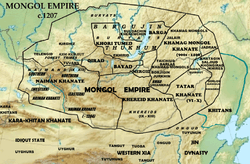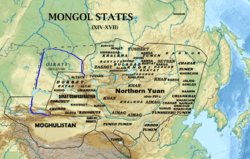Bayads
The Bayad (Mongol: Баяд/Bayad, lit. "the Riches") is the third largest subgroup of the Mongols in Mongolia and they are a tribe in Four Oirats. Bayads were a prominent clan within the Mongol Empire. Bayads can be found in both Mongolic and Turkic peoples. Within Mongols, the clan is spread through Khalkha, Inner Mongolians, Buryats and Oirats.
| Total population | |
|---|---|
| 56,573 | |
| Regions with significant populations | |
| 56,573[1] | |
| Languages | |
| Oirat | |
| Religion | |
| Tibetan Buddhism, Shamanism , Atheism | |
| Related ethnic groups | |
| Mongols, especially Oirats | |
History


The Bayid are originated from Bayaud (Bayagud) tribes called Jida Bayagud (Bayaud of Jida river), Bayaud Duklas, Kheeriin Bayaud, who were inhabitants of eastern valleys of Selenge River. The Bayad Mongols were inhabitants of the Jida river, Selenge River valleys and Russian Kyakhtinsky District but they moved to the southwest in the 17th century.[2]
They played influential roles in the Mongol Empire, later becoming part of the Four Oirat confederation.
Notable members
- Köke Temür - general of the Yuan dynasty
- Bulughan Khatun - favorite wife of Ilkhan Abagha
- Kököchin - principal wife of Ilkhan Ghazan, who was escorted from Khanbaliq (Beijing) to Persia by Marco Polo
- Jambyn Batmönkh - a Mongolian communist political leader, in 1984 - 1990 head of Mongolia.
- Khorloogiin Bayanmönkh - Mongolian best wrestler of the 20th century in Mongolian wrestling and 1975 freestyle wrestling world champion.
- Norovyn Altankhuyag - Prime Minister of Mongolia, 2012–2014 Democratic Party (Mongolia)
- Mishigiin Sonompil - Member of Parliament
Modern demographics
Today, Bayads are settled in the districts of Khyargas, Malchin, Tes, Züüngovi, Baruunturuun and Naranbulag in the province of Uvs. According to the census taken in 2000, 50,824 Bayads currently live in Mongolia. [3]
References
Literature
- [hamagmongol.narod.ru/library/khoyt_2008_r.htm Хойт С.К. Антропологические характеристики калмыков по данным исследователей XVIII-XIX вв. // Вестник Прикаспия: археология, история, этнография. № 1. Элиста: Изд-во КГУ, 2008. с. 220-243.]
- [hamagmongol.narod.ru/library/khoyt_2012_r.htm Хойт С.К. Калмыки в работах антропологов первой половины XX вв. // Вестник Прикаспия: археология, история, этнография. № 3, 2012. с. 215-245.]
See also
- Bayat (tribe) (Turkic)
- Bayad tribe (India)
- Bayat tribe (Arabic)